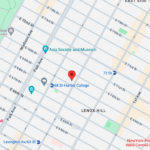Neck pain is a very common chronic condition for those who sit at a desk for a majority of the week as well as for the avid exerciser. We have all heard of a pinched nerve and it is very often the culprit when we experience neck pain that keeps coming back. But what exactly does having a pinched nerve mean and what can we do about it?
The technical term for a pinched nerve in the neck is called cervical radiculopathy. ‘Cervical’ refers to the portion of vertebrae in our spine that make up our neck. ‘Radiculopathy’ is a medical term used when a nerve is compressed or irritated, causing symptoms like numbness, tingling, or pain in the muscles of the neck and upper limbs.
Cervical radiculopathy can occur for a number of reasons. It could be caused by things we do every day that strain our neck, such as sitting for hours at a time with poor posture or carrying heavy objects.
There are also some underlying conditions that can cause cervical radiculopathy that need to be diagnosed and treated by a pain management specialist like Dr. Michael Y. Mizhiritsky. These include:
- Cervical Herniated Disc: A herniated disc is disc between our vertebrae that has slipped from its position and is compressing a nerve in the spinal area.
- Degenerative Disc Disease: Is a localized wear and tear on the intervertebral discs causing the discs to lose their ability to shock absorb and thus put added compression and pressure on the spinal nerves.
- Spinal Stenosis: Is a consequence of spinal arthritis in which the spinal canal is damaged and over time becomes narrower, causing great strain on the spinal nerves.
The possible underlying causes of pain and discomfort in your neck make it important to speak to a physician and get a proper diagnose. A neck specialist like Dr. Mizhiritsky can discuss the best course of treatment for you.
Dr. Mizhiritsky will always recommend a few months of conservative therapies to relieve symptoms of cervical radiculopathy. Conservative methods are often very effective in managing neck pain and radiating pain from a pinched nerve. This can include:
- Physical Therapy: Manual therapy is an effective way of relieving inflammation and muscle spasms and tightness in the area. Your therapist will address the posture that triggers your neck pain and teach you how to easily stretch your neck muscles to prevent tightness from setting in during activities that may strain the neck. Physical therapy done regularly with a highly trained professional will almost always relieve cervical radiculopathy, depending on the severity of your case.
- Cervical Epidural Steroid Injections: Epidural Injections are effective in managing severe pain caused by cervical pinched nerves. An anti-inflammatory medication is injected directly near the affected nerve, reducing the inflammation of the tissues compressing the spinal nerve. Though these injections very rarely have any side effects and can be used as a fairly regular therapy, they are usually done with the goal of relieving pain enough to complete a physical rehabilitation program.




